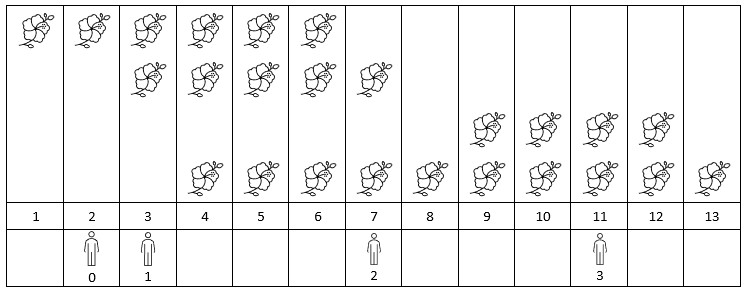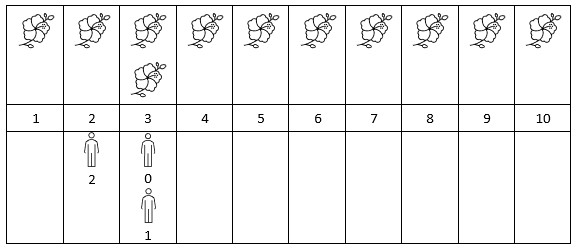You are given a 0-indexed 2D integer array flowers, where flowers[i] = [starti, endi] means the ith flower will be in full bloom from starti to endi (inclusive). You are also given a 0-indexed integer array persons of size n, where persons[i] is the time that the ith person will arrive to see the flowers.
Return an integer array answer of size n, where answer[i] is the number of flowers that are in full bloom when the ith person arrives.
Example 1:

Input: flowers = [[1,6],[3,7],[9,12],[4,13]], persons = [2,3,7,11] Output: [1,2,2,2] Explanation: The figure above shows the times when the flowers are in full bloom and when the people arrive. For each person, we return the number of flowers in full bloom during their arrival.
Example 2:

Input: flowers = [[1,10],[3,3]], persons = [3,3,2] Output: [2,2,1] Explanation: The figure above shows the times when the flowers are in full bloom and when the people arrive. For each person, we return the number of flowers in full bloom during their arrival.
Constraints:
1 <= flowers.length <= 5 * 104flowers[i].length == 21 <= starti <= endi <= 1091 <= persons.length <= 5 * 1041 <= persons[i] <= 109
Solution: Prefix Sum + Binary Search
Use a treemap to store the counts (ordered by time t), when a flower begins to bloom at start, we increase m[start], when it dies at end, we decrease m[end+1]. prefix_sum[t] indicates the # of blooming flowers at time t.
For each people, use binary search to find the latest # of flowers before his arrival.
Time complexity: O(nlogn + mlogn)
Space complexity: O(n)
C++
|
1 2 3 4 5 6 7 8 9 10 11 12 13 14 15 16 |
// Author: Huahua class Solution { public: vector<int> fullBloomFlowers(vector<vector<int>>& flowers, vector<int>& persons) { map<int, int> m{{0, 0}}; for (const auto& f : flowers) ++m[f[0]], --m[f[1] + 1]; int sum = 0; for (auto& [t, c] : m) c = sum += c; vector<int> ans; for (int t : persons) ans.push_back(prev(m.upper_bound(t))->second); return ans; } }; |

